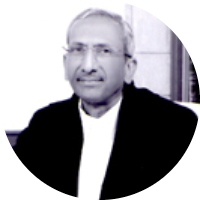A. K. Goel

A. K. Goel
Former Judge of the Supreme Court of India
Assumed Office7th Jul, 2014
Retired On6th Jul, 2018
Previously
Chief Justice of the Orissa High Court October 12th 2013 - July 6th 2014
Chief Justice of the Gauhati High CourtDecember 20th 2011-October 11th 2013
Acting Chief Justice of the Punjab and Haryana High Court May 2nd 2011 - September 12th 2011
Judge of the Punjab and Haryana High Court July 2nd 2001- May 1st 2011
Profile
Justice Goel graduated from Panjab University. He enrolled as an Advocate with the Bar Council of Punjab and Haryana in 1974 and practised before the High Court of Punjab and Haryana for about five years and before the Supreme Court of India and Delhi High Court for about 22 years. In 1999, he was designated as Senior Advocate by the Supreme Court. Justice Goel was elevated as Judge of the Punjab and Haryana High Court in 2001 and was appointed as the Executive Chairman of Haryana State Legal Services Authority in 2005. He was the Acting Chief Justice of the Punjab and Haryana High Court in 2011. Justice Goel was sworn in as Chief Justice of the Gauhati High Court in December 2011. He was subsequently transferred to the Orissa High Court and was sworn in as its Chief Justice in 2013. He was then elevated as Judge of Supreme Court and assumed charge on July 7th 2014.
Notable Judgements
Justice Goel was a part of the two-Judge Bench of the Supreme Court which held that the 6 months waiting period prescribed under the Hindu Marriage Act for divorce by mutual consent is not mandatory, and can be waived under certain circumstances.
Highlighting the importance of having men and women with leadership qualities among the subordinate judiciary which has over two crore pending cases, a Bench of Justices A.K. Goel and U.U. Lalit, held there was no room for non-performers among the subordinate judiciary. “Public interest is above individual interest,” Justice Goel wrote. Thus the Bench fixed a time-bound hearing and disposing of criminal cases, especially those involving bail; and constant monitoring by the High Court over the functioning of subordinate Courts.
He was a part of the bench that held that polygamy is not an intrinsic part of any religion and the government can frame laws to regulate it and that a Muslim’s fundamental right to practice Islam did not include polygamy.
He was also a part of the Bench that framed guidelines to prevent the ‘misuse’ of Section 498A IPC.
A bench comprising of Justice T. S. Thakur and Justice Adarsh Kumar Goel ruled that in cases where the accused is unable to pay the required compensation to the victim or his/her family, then the State government should pay the same compensation as ordered by the court.
Tracked Cases
